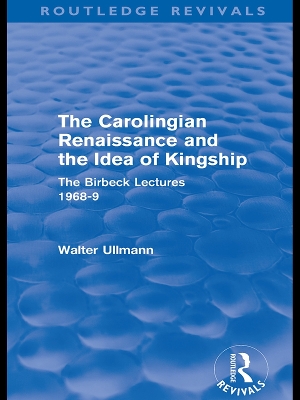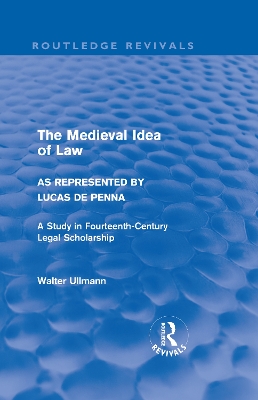Routledge Revivals: Walter Ullmann on Medieval Political Theory
4 total works
In many respects this book, first published in 1961, marked a somewhat radical departure from contemporary historical writings. It is neither a constitutional nor a political history, but a historical definition and explanation of the main features which characterised the three kinds of government which can be discerned in the Middle Ages - government by the Pope, the King, the People. The author's enviable knowledge of the sources - clerical, secular, legal, constitutional, liturgical, literary - as well as of modern literature enables him to demonstrate the principles upon which the papal government, the royal government, and the government of the people rested. He shows how the traditional theocratic forms of government came to be supplanted by forms of government based on the will of the people. Although concerned with the Middle Ages, the book also contains much that is of topical interest to the discerning student of modern institutions. Medieval history is made understandable to modern man by modern methods.
The Carolingian Renaissance and the Idea of Kingship (Routledge Revivals)
by Walter Ullmann
In his Birkbeck Lectures, first published in 1969, Professor Ullmann throws new light on a familiar subject. He shows that the Carolingian renaissance had a wider and deeper meaning than has often been thought, especially in its political and ideological aspects. Displaying his mastery of both primary and secondary sources, Professor Ullmann presents an integrated history. He shows an epoch which holds a key to the better understanding not only of the subsequent medieval centuries, but also of modern Europe. This book opened new vistas in political, ideological and social history as well as in historical theology and jurisprudence and showed how relevant knowledge of the past is for the understanding of the present.
The Medieval Idea of Law as Represented by Lucas de Penna (Routledge Revivals)
by Walter Ullmann
Upon its original publication in 1946, this work represented a new approach to medieval studies, offering indispensable analysis to the historian of legal, political and social ideas. Research into the original sources leads the author through unexplored realms of medieval thought. By contrasting contemporary opinions with those of his central figure, Lucas de Penna, he comprehensively presents the medieval idea of law - then regarded as the concrete manifestation of abstract justice. The intensity of medieval academic life is revealed in the heated controversies, whilst medieval criminology foreshadows modern developments. A significant discovery is the astonishingly great reliance which Continental scholars placed upon English thought. A challenge to certain current misconceptions, this book shows the resourcefulness of medieval thinking and the extent to which modern ideas were foreshadowed in the fourteenth century, a time when the ideas of law and liberty were identical.
Celebrated Austrian-Jewish scholar Walter Ullmann (1910-1983) was a leading authority in the field of medieval political thought, and in particular legal theory. He settled in the United Kingdom after leaving Austria in the late 1930s and went on to hold positions at the University of Leeds and Trinity College, Cambridge as Professor of Medieval History. Featured in this Routledge Revivals collection are the works: The Medieval Idea of Law as Represented by Lucas de Penna (1946), The Principles of Government and Politics in the Middle Ages (1961), The Individual and Society in the Middle Ages (1966) and The Carolingian Renaissance and the Idea of Kingship (1969).


